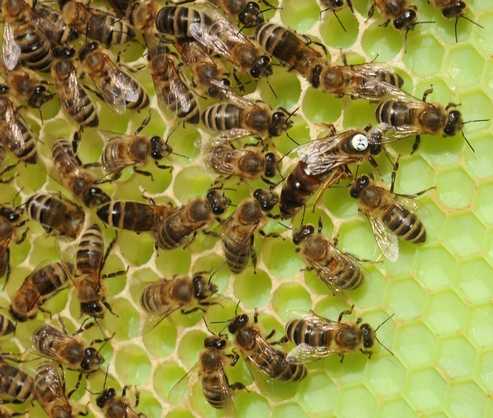Bee up Image ©RoxanaVilla
Bees need protection. You may be aware of Colony Collapse Disorder, but you may not know that scientists haven’t yet figured out what’s causing it. I watched a PBS program last week about the bee population having been completely decimated in some parts of China, from pollution and chemical exposure; they are now spending exorbitant amounts of money to hand pollinate fruit trees. We should learn from their mistakes! The video called ‘Silence of the Bees’, tells the tale of the collapse in different regions of the world.
To help offer exposure to the issue, Roxana of Illuminated Perfume from the Artisan Gallery Team on Etsy, launched a “Bee Up” blog chain in which many members are participating by posting about honey bees on their personal blogs. You can find the full list here. Roxana was also featured in an article on Etsy’s blog about Holistic Beekeeping.
During my stint last season as a Coordinator for Maysie’s Conservation Center SAITA program, an internship here in southeastern PA for aspiring farmers, I wrote about a honey bee production workshop on the farm’s blog, which you can read here. And I’ve included a video excerpt below.
Small farmers aren’t stressing their bees by shuttling them back and forth to distant pollination farms, and are using less pesticides than mono-cropped industrial farms. Scientists now suspect pesticides as another cause of colony collapse.
So please, don’t use pesticides outdoors when bees are active. If you must use them in your yard, wait until after dusk when the bees have gone back to their hives. In fact, there are plenty of other beneficial insects highly sensitive to pesticides and chemicals, so it’s a good reason to use integrated pest management and restrict your use of pesticides altogether.
You can find more information from this wonderful workshop given by the scintillating Mike McGrath of NPR’s ‘You Bet Your Garden‘, about helpful insects and creatures in my post here.
To encourage bees in your yard, everyone can easily plant flowers or shrubs that bees love, even in a small apartment rooftop garden. Lavender, Monarda (bee balm is the common name) and Buddleia, (butterfly bush) are just three easy to grow plants that bees can’t resist.
Trey Flemming at Two Gander Farms in Oley, PA  began the workshop by showing us a cutaway of a hive, with the brood’s nest on the bottom, pollen in the middle, with honey situated at the top. 80% of the bees are sexually inactive female workers, 10-20% are the male drones. While there is only one queen and she never leaves the nest, the bees function as one entity, they’ll share food and pheromones. There can be from 30,000 to 50,000 bees in one colony, with just one queen. Trey uses the standard moveable frame Langstroth hive, invented by Philadelphia native, Reverend Lorenzo Langstroth, in 1851.
View movie of hive breakdown below:
Try to find local raw honey to help boost your own immune system from allergies to plants like ragweed. Honey has healthful properties that scientists are still analyzing today.
Some photos of the Artisan Gallery Teams’ bee inspired creations:
1. SewnNatural
2. Betsy Bensen
4. PaulaArt
8. Aroluna
Finally, please review yesterday’s post from Irene at Aroluna and don’t forget to check tomorrow’s post by Marta, you can view it here.
Save the bees and keep our fruits and vegetables pollinated!





Great article!
We have a huge amount of bees here, I can actually here them bussily zooming at day time 🙂
Very nice bee post; Even if the last photo made me back off a few inches from the screen…
It is sad that we humans causes so much damage in our world and the small animals are the first who suffer because of it 🙁
Thanks for bringing attention to this profound tragedy. I hope people take your advice about pesticides and integrated soil management. As Albert Einstein said, humanity would disappear without bees.